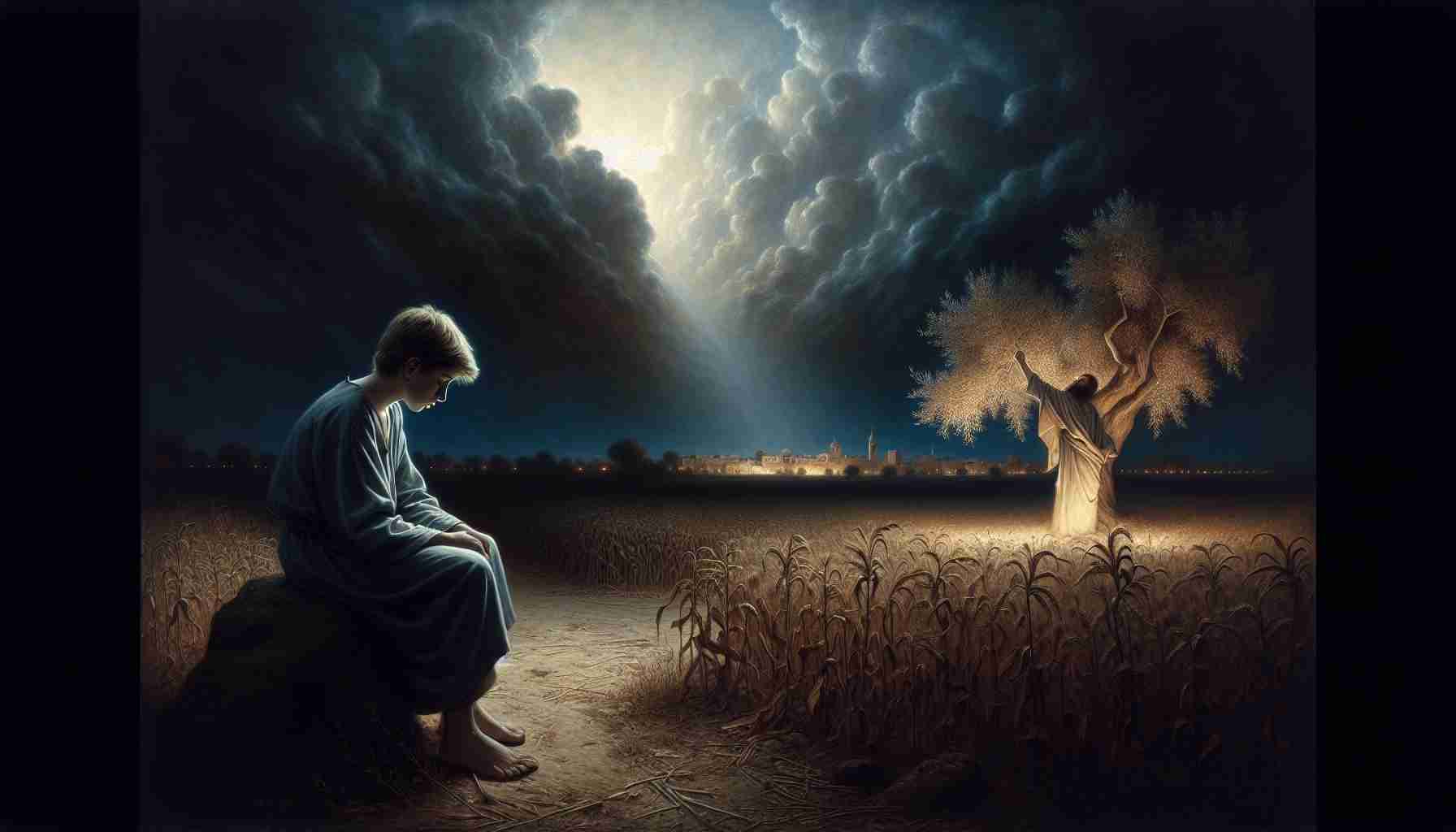

I had never seen daylight swallowed like that before. One moment, the sun was bright over the rooftops of our village, and the next, darkness poured from the sky like smoke. My fingers trembled as I clutched a wooden bowl, water sloshing out and soaking my apron. The air was thick, not like a storm—more like a warning.
My name won’t appear in the scrolls, but I lived in Yehudah—Judah—when the prophet Yoel, whom you may know as Joel, spoke about something called the “Day of the Lord.” He said it would be great and terrible, a day filled with fire, darkness, and judgment. I didn’t want to believe it. What kind of day is both great and terrible?
It started with the locusts.
At first, we thought it was a small swarm. But they kept coming—clouds of them, chewing through every field, every tree. I watched my father’s face as he ran his hand through dry wheat stalks that had been green only days before. I had never seen such fear in my father’s eyes. He was a strong man, but this—this left him speechless.
“Why would Hashem—God—send this?” I whispered, though no one answered.
Then Yoel came to our town. He was not loud, but his words shook us. He said, “Sound the shofar in Tzion! Let all the people tremble—for the day of the Lord is coming!”
Some mocked him. Others only stared. But my mother listened.
“We must return to Him,” she said, and I knew she meant teshuvah—the act of returning to God after doing wrong. “We’ve forgotten His ways. The prophet says He will forgive if we fast and pray with true hearts.”
So we did. My family took off our fine garments and put on rough cloth called sackcloth. We didn't eat. We wept aloud. The whole village gathered in the square with the kohenim—the priests—praying, “Spare Your people, O Lord!”
That night, I heard my mother sob in the dark.
“Do you think He hears us?” I asked her.
She pressed my hand. “Yoel says He is merciful—slow to anger and full of kindness.”
The next morning, the light returned. No more locusts. And for the first time in weeks, rain.
As we planted new seeds, Yoel returned with a promise—not just from him, but from God himself: “I will pour out My spirit on all flesh. Your sons and daughters will speak My words. Even the servants shall see visions.”
I didn’t understand it all then. But I knew what a promise felt like. Warm and clean, like sunlight after months of shadow.
Now I am old, and you still won’t find my name in the scrolls. But I remember that darkness. I remember the fear in my village, and the hope that followed. The Day of the Lord was real—but so was the mercy.
And that, I think, is what saved us.
I had never seen daylight swallowed like that before. One moment, the sun was bright over the rooftops of our village, and the next, darkness poured from the sky like smoke. My fingers trembled as I clutched a wooden bowl, water sloshing out and soaking my apron. The air was thick, not like a storm—more like a warning.
My name won’t appear in the scrolls, but I lived in Yehudah—Judah—when the prophet Yoel, whom you may know as Joel, spoke about something called the “Day of the Lord.” He said it would be great and terrible, a day filled with fire, darkness, and judgment. I didn’t want to believe it. What kind of day is both great and terrible?
It started with the locusts.
At first, we thought it was a small swarm. But they kept coming—clouds of them, chewing through every field, every tree. I watched my father’s face as he ran his hand through dry wheat stalks that had been green only days before. I had never seen such fear in my father’s eyes. He was a strong man, but this—this left him speechless.
“Why would Hashem—God—send this?” I whispered, though no one answered.
Then Yoel came to our town. He was not loud, but his words shook us. He said, “Sound the shofar in Tzion! Let all the people tremble—for the day of the Lord is coming!”
Some mocked him. Others only stared. But my mother listened.
“We must return to Him,” she said, and I knew she meant teshuvah—the act of returning to God after doing wrong. “We’ve forgotten His ways. The prophet says He will forgive if we fast and pray with true hearts.”
So we did. My family took off our fine garments and put on rough cloth called sackcloth. We didn't eat. We wept aloud. The whole village gathered in the square with the kohenim—the priests—praying, “Spare Your people, O Lord!”
That night, I heard my mother sob in the dark.
“Do you think He hears us?” I asked her.
She pressed my hand. “Yoel says He is merciful—slow to anger and full of kindness.”
The next morning, the light returned. No more locusts. And for the first time in weeks, rain.
As we planted new seeds, Yoel returned with a promise—not just from him, but from God himself: “I will pour out My spirit on all flesh. Your sons and daughters will speak My words. Even the servants shall see visions.”
I didn’t understand it all then. But I knew what a promise felt like. Warm and clean, like sunlight after months of shadow.
Now I am old, and you still won’t find my name in the scrolls. But I remember that darkness. I remember the fear in my village, and the hope that followed. The Day of the Lord was real—but so was the mercy.
And that, I think, is what saved us.